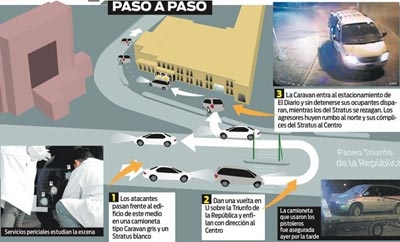Armed men shot up the offices of a newspaper and a TV station in Ciudad Juarez, Mexico in the third reported attack against Mexican journalists and media institutions in the last week.
In the early hours of March 6, assailants traveling in a mini-van fired at least seven rounds as they drove past the reception area of El Diario de Juarez building, El Diario reported.
Shortly after, a similar vehicle shot at least 10 rounds at TV station Canal 44’s security gate. No one was hurt in either attack.
The following day, Police found the vehicle they believed was used in the attacks, which had been stolen the month before. They have so far detained nine people for questioning in connection with the assaults, although no arrests have been made.
Five of the arrested men work as private security guards at one of the city’s gated communities. An hour before the attacks, one of the guards had threatened a Diario journalist who was reporting on a fire at the community. According to the journalist, the guard told him, “You are over the line of private property, you have five seconds, if you don’t leave I’ll shoot you.”
The assault follows the murder of the director of a news website in the municipality of Ojinaga, in the same state, Chihuahua, earlier in the week.
In February, assailants shot at the facilities of the newspaper El Siglo de Torreon in the neighboring state of Coahuila, three times in three days. The attacks followed the kidnapping of five of the newspaper’s journalists earlier in the month.
InSight Crime Analysis
The recent attacks in Chihuahua follow a fierce broadside launched against the press by Ciudad Juarez police chief, Julian Leyzaola, who said some local media groups were “digging their own graves” because of their “yellow” journalism.
The controversial Leyzaola, whose hardline tactics have earned him praise for helping bring violence under control in Juarez and criticism for alleged human rights abuses (See InSight Crime special — Juarez After the War), mentioned Canal 44 several times as he railed against the reporting of police abuses, which he said were treated like a “reality TV show.”
Both the physical and verbal attacks on Mexican media institutions highlight the dangerous environment journalists in Mexico frequently operate in, where they are at risk from criminal groups but cannot always turn to the authorities for protection.
The state has consistently failed to provide adequete protection for journalists since drug war violence exploded in 2006, and although then President Felipe Calderon passed a law on protection for media and human rights workers in 2012, impunity in crimes against journalists remains widespread.


